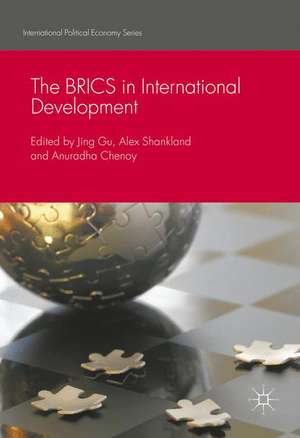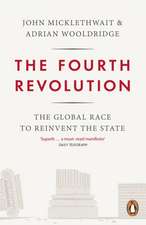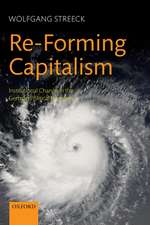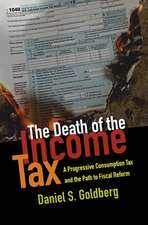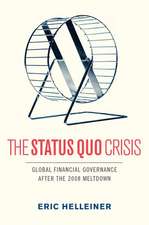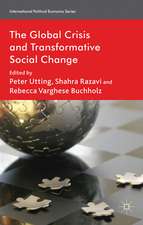The BRICS in International Development: International Political Economy Series
Editat de Jing Gu, Alex Shankland, Anuradha Chenoyen Limba Engleză Hardback – 17 oct 2016
| Toate formatele și edițiile | Preț | Express |
|---|---|---|
| Paperback (1) | 580.68 lei 6-8 săpt. | |
| Palgrave Macmillan UK – 21 apr 2021 | 580.68 lei 6-8 săpt. | |
| Hardback (1) | 727.80 lei 6-8 săpt. | |
| Palgrave Macmillan UK – 17 oct 2016 | 727.80 lei 6-8 săpt. |
Din seria International Political Economy Series
- 9%
 Preț: 831.25 lei
Preț: 831.25 lei - 20%
 Preț: 751.84 lei
Preț: 751.84 lei - 17%
 Preț: 490.25 lei
Preț: 490.25 lei - 17%
 Preț: 363.48 lei
Preț: 363.48 lei - 20%
 Preț: 690.96 lei
Preț: 690.96 lei - 20%
 Preț: 627.55 lei
Preț: 627.55 lei - 9%
 Preț: 762.80 lei
Preț: 762.80 lei -
 Preț: 430.59 lei
Preț: 430.59 lei -
 Preț: 428.68 lei
Preț: 428.68 lei -
 Preț: 147.23 lei
Preț: 147.23 lei - 20%
 Preț: 566.64 lei
Preț: 566.64 lei -
 Preț: 385.08 lei
Preț: 385.08 lei -
 Preț: 389.11 lei
Preț: 389.11 lei - 15%
 Preț: 644.30 lei
Preț: 644.30 lei -
 Preț: 389.31 lei
Preț: 389.31 lei - 15%
 Preț: 644.30 lei
Preț: 644.30 lei -
 Preț: 413.84 lei
Preț: 413.84 lei -
 Preț: 387.38 lei
Preț: 387.38 lei - 15%
 Preț: 638.89 lei
Preț: 638.89 lei - 15%
 Preț: 644.63 lei
Preț: 644.63 lei - 18%
 Preț: 893.71 lei
Preț: 893.71 lei -
 Preț: 412.47 lei
Preț: 412.47 lei -
 Preț: 325.08 lei
Preț: 325.08 lei -
 Preț: 395.47 lei
Preț: 395.47 lei - 15%
 Preț: 641.85 lei
Preț: 641.85 lei -
 Preț: 391.40 lei
Preț: 391.40 lei -
 Preț: 388.34 lei
Preț: 388.34 lei - 15%
 Preț: 640.55 lei
Preț: 640.55 lei -
 Preț: 389.70 lei
Preț: 389.70 lei - 15%
 Preț: 646.30 lei
Preț: 646.30 lei - 15%
 Preț: 637.78 lei
Preț: 637.78 lei - 15%
 Preț: 643.84 lei
Preț: 643.84 lei -
 Preț: 386.99 lei
Preț: 386.99 lei - 15%
 Preț: 641.53 lei
Preț: 641.53 lei -
 Preț: 386.81 lei
Preț: 386.81 lei - 15%
 Preț: 639.73 lei
Preț: 639.73 lei - 18%
 Preț: 944.19 lei
Preț: 944.19 lei -
 Preț: 391.40 lei
Preț: 391.40 lei -
 Preț: 330.65 lei
Preț: 330.65 lei -
 Preț: 394.12 lei
Preț: 394.12 lei -
 Preț: 386.99 lei
Preț: 386.99 lei -
 Preț: 386.81 lei
Preț: 386.81 lei -
 Preț: 387.75 lei
Preț: 387.75 lei - 15%
 Preț: 634.68 lei
Preț: 634.68 lei -
 Preț: 392.60 lei
Preț: 392.60 lei - 15%
 Preț: 641.53 lei
Preț: 641.53 lei - 15%
 Preț: 640.06 lei
Preț: 640.06 lei - 15%
 Preț: 643.16 lei
Preț: 643.16 lei - 15%
 Preț: 642.68 lei
Preț: 642.68 lei - 15%
 Preț: 641.85 lei
Preț: 641.85 lei
Preț: 727.80 lei
Preț vechi: 887.55 lei
-18% Nou
Puncte Express: 1092
Preț estimativ în valută:
139.31€ • 151.37$ • 117.09£
139.31€ • 151.37$ • 117.09£
Carte tipărită la comandă
Livrare economică 21 aprilie-05 mai
Preluare comenzi: 021 569.72.76
Specificații
ISBN-13: 9781137556455
ISBN-10: 1137556455
Pagini: 280
Ilustrații: XXI, 248 p. 5 illus.
Dimensiuni: 148 x 210 x 20 mm
Greutate: 0.45 kg
Ediția:1st ed. 2016
Editura: Palgrave Macmillan UK
Colecția Palgrave Macmillan
Seria International Political Economy Series
Locul publicării:London, United Kingdom
ISBN-10: 1137556455
Pagini: 280
Ilustrații: XXI, 248 p. 5 illus.
Dimensiuni: 148 x 210 x 20 mm
Greutate: 0.45 kg
Ediția:1st ed. 2016
Editura: Palgrave Macmillan UK
Colecția Palgrave Macmillan
Seria International Political Economy Series
Locul publicării:London, United Kingdom
Cuprins
Introduction. International Development, South-South Cooperation and the Rising Powers; Jing Gu, Richard Carey, Alex Shankland, Anuradha Chenoy.- Chapter 1. Brazil as a development partner under Lula and Rousseff: Shifts and continuities; Bianca Suyama, Laura Trajber Waisbich and Iara Costa Leite.- Chapter 2. Russia: A re-emerging donor; Marina Larionova, Mark Rakhmangulov and Marc P. Berenson.- Chapter 3. India: From technical cooperation to trade and investment; Anuradha Chenoy and Anuradha Joshi.- Chapter 4. China on the move: The ‘New Silk Road’ to international development cooperation?; Jing Gu, Yunnan Chen and Wang Haibin.- Chapter 5. South Africa: security and stability in development cooperation; Neuma Grobbelaar.- Chapter 6. Civil society, BRICS and international development cooperation: perspectives from India, South Africa and Brazil; Melissa Pomeroy, Alex Shankland, Adele Poskitt, Kaustuv Kanti Bandyopadhyay and Rajesh Tandon.- Chapter 7. Looking across BRICS: An emerging international development agenda?; Anuradha Chenoy, Marina Larionova, Richard Manning and Jennifer Constantine.
Notă biografică
Jing Gu is Director of the Centre for Rising Powers and Global Development at the Institute of Development Studies, UK.
Alex Shankland is Research Fellow at the Institute of Development Studies, UK.
Anuradha Chenoy is Professor at the School of International Studies, Jawaharlal Nehru University, India.
Alex Shankland is Research Fellow at the Institute of Development Studies, UK.
Anuradha Chenoy is Professor at the School of International Studies, Jawaharlal Nehru University, India.
Textul de pe ultima copertă
This book offers a comprehensive comparative perspective on the increasingly significant development cooperation activities of the BRICS. Providing a powerful set of insights into the drivers for engagement within each country, it brings together leading experts from Brazil, Russia, India, China, South Africa and OECD countries. The authors review the empirical evidence for the BRICS’ modes of development cooperation and their geographical reach, and explore the historical background and patterns of international development engagement of each country. They also present a cutting-edge analysis of the broader geopolitical shifts, distinctive ideologies and normative discourses that are influencing and informing their engagement in increasingly ambitious joint projects such as the New Development Bank. This collection is essential reading for anyone seeking to understand the rapidly changing landscape of international development.
Caracteristici
Represents a major contribution to international development studies Provides a very thorough and empirically rich treatment of the BRICS’ modes of development cooperation Crosses disciplines to create a work of considerable breadth
